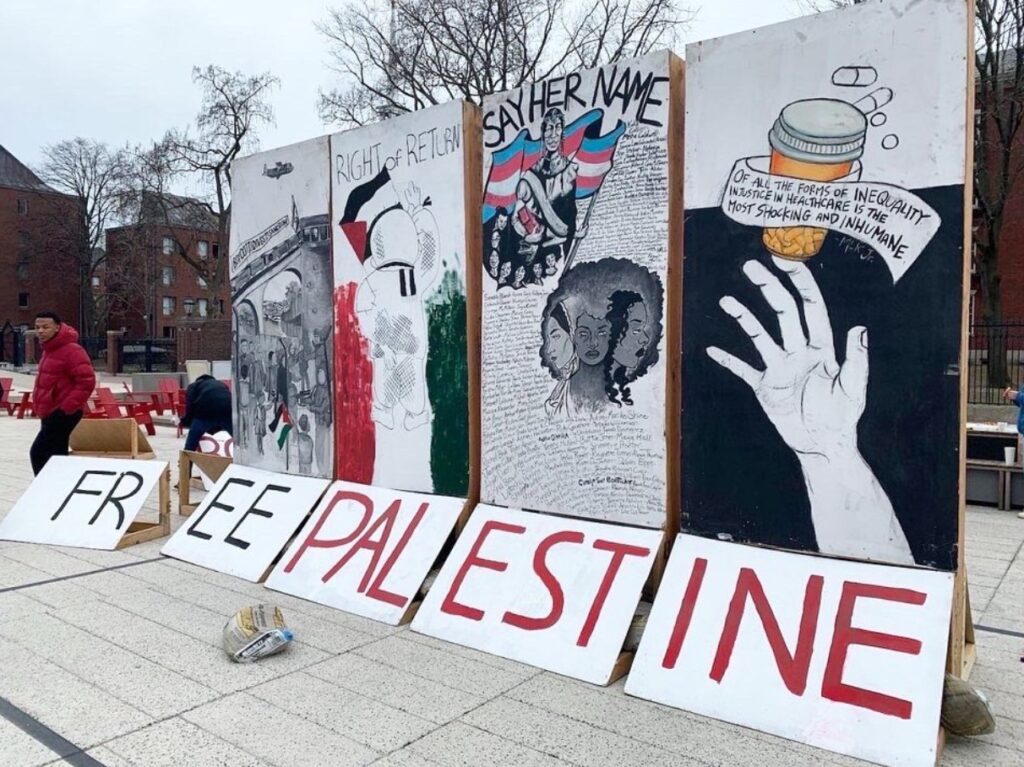Alan Garber, Harvard’s interim president, said he will ask to ‘promptly initiate applicable reinstatement proceedings for all individuals who have been placed on involuntary leaves of absence.’
By JNS
Ten days before its commencement ceremony is scheduled, Harvard University cut a deal with anti-Israel protesters who created an illegal encampment on campus.
Alan Garber, Harvard’s interim president, announced on Tuesday that he will “facilitate a meeting with the chair of the Corporation Committee on Shareholder Responsibility and other university officials to address questions about the endowment.”
“In keeping with my commitment to ongoing and reasoned dialogue, the dean of the faculty of arts and sciences and I will meet with students to hear their perspectives on academic matters related to longstanding conflicts in the Middle East,” Garber added.
Now that the “disruption to the educational environment caused by the encampment” has ended, Garber said he will ask the university’s schools to “promptly initiate applicable reinstatement proceedings for all individuals who have been placed on involuntary leaves of absence.”
“I will also ask disciplinary boards within each school to evaluate expeditiously, according to their existing practices and precedents, the cases of those who participated in the encampment,” he added, acknowledging “the profound grief that many in our community feel over the tragic effects of the ongoing war.”
Harvard Out of Occupied Palestine, which goes by HOOP, organized the anti-Israel protests at the university. It claimed victory and vowed to keep fighting.
“As a precondition for decamping, administration will retract suspensions,” it wrote on Instagram. “Administration has also offered us meetings regarding disclosure and divestment with members of the Harvard Management Company and ‘conversations’ regarding the establishment of a Center for Palestine Studies at Harvard.”
“We are under no illusions: We do not believe these meetings are divestment wins,” added the group, which called Harvard “the rotten heart of a dying empire.”
“These side deals are intended to pacify us away from full disclosure and divestment,” it added. “Rest assured, they will not.”
The Harvard Crimson reported that “despite Garber repeatedly insisting that the university would not negotiate with the protesters, the outcome of the 20-day occupation of the yard demonstrated that he ultimately preferred to continue seeking a negotiated end to the encampment than sending in Harvard University police officers to clear the tents and arrest protesters.”
An anti-Israel encampment on the Harvard University campus in Cambridge, Mass., on May 12, 2024. Credit: PhillipJR/Shutterstock.
Dr. Jeffrey Flier, a former dean of Harvard’s medical faculty, wrote that “it is good that the encampment is coming down without police involvement.”
“But as one among many who does not view the institution at which I have lived my professional life as ‘the rotten heart of a dying empire’ (in the statement by HOOP this am), we are at a moment when Harvard leaders and faculty (or a major fraction of them) must set a path for a better future,” added the Harvard professor of physiology and medicine and a distinguished service professor. “One where the agenda is not set by those holding such disdain for Harvard and its rules and values.”
Harvard’s mission should be restated “with clarity, seriousness and integrity,” with “a deeper explanation of the agreements that were made” and “a commitment to producing a plan for response to future events with content-neutral policies linked to identified consequences for violations,” Dr. Flier added.
Carole Hooven, a nonresident senior fellow at the American Enterprise Institute who recently left Harvard after being caught in a diversity, equity and inclusion “web,” wrote that she was “relieved” to see the encampment end peacefully.
She added that Harvard administrators should not “have caved in to demands and rewarded students’ disruptive, rule-breaking behavior with benefits that rule-followers aren’t entitled to.”
“I wanted to meet with Garber (when he was provost!),” she wrote. “I politely made my case, and he refused. Perhaps I should consider alternative tactics.”
Shabbos Kestenbaum, a Harvard student who has filed a lawsuit against the university, wrote that its deal with the protesters is an illustration of “Harvard’s antisemitism in real-time.”
“Harvard has agreed with almost all of their demands. I’ve never been this disillusioned than this morning,” he said. “The encampment espoused near daily antisemitism, harassed and followed Jews, called for the violent destruction of the Jewish state and violated school policy.”
“Not once has Harvard publicly condemned the objective antisemitism that we Jewish students have faced as a result. Not once has the antisemitism task force said anything. More importantly, not once have they done anything to combat antisemitism here at Harvard,” he added.
“Jews here have no allies, no voice, and no advocates. The only way Harvard will ever change is sustained outside pressure. Please help us.”


